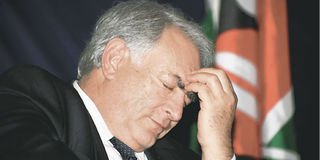IMF chief leaves his future in hotel room

International Monetary Fund managing director Dominique Strauss-Kahn during a debate at the University of Nairobi last year. Mr Strauss-Kahn, widely expected to run for the French presidency next year, was on May 15, 2011 charged with sexual assault and attempted rape at a New York hotel. Photo/FILE
NEW YORK, Sunday
IMF chief Dominique Strauss-Kahn is a man who would seem to have it all: a brilliant career which has taken him to the pinnacle of success with a real shot at becoming the next president of France.
But early on Sunday he was charged with sexual assault and attempted rape of a hotel maid in New York, only hours after being escorted off an Air France flight about to take off from the city.
It was a humiliating turn of events for a man who has built his reputation as a renowned economist and a business-friendly socialist, and who vowed to reform the International Monetary Fund when he took up the helm in 2007.
The 62-year-old was widely expected to stand in the 2012 French presidential elections after a failed bid in 2006, and even though he had not announced his run officially, he was already leading in the polls.
A silver-haired, gifted orator, fluent in English and German, Strauss-Kahn, was a former economics professor who won respect in European circles as a competent finance minister for France from 1997 to 1999.
During that time, he took part in negotiations on the creation of the single European currency, the euro, and generated a wave of privatisations, including that of France Telecom, overcoming resistance within socialist ranks.
The politician had presented himself as the reform candidate for the 187-country IMF, based in Washington.
“Many reforms must imperatively be put in place,” he said just after his appointment, adding that in an increasingly globalised world, the IMF must be able to fulfil its mission of promoting financial stability.
“I am determined to pursue without delay the reforms needed for the IMF to make financial stability, serve the international community, while fostering growth and employment,” he added.
He acknowledged that “it will be a hard task for all of us to rebuild both the relevance and the legitimacy of this organisation.
“But I am prepared to do that and I ask you to be prepared as well,” he said, promising to be “a consensus builder.”
But the Frenchman’s candidacy had stirred some controversy in Europe, and he has had several run-ins with scandal.
European countries traditionally select the head of the IMF and the United States the president of the World Bank, but that agreement has come under increased criticism.
Born to a Jewish family in the affluent Paris suburb of Neuilly-sur-Seine on April 25, 1949, Strauss-Kahn spent part of his childhood in Morocco and later studied at the elite Paris Institute of Political Studies (SciencesPo) and the Hautes Etudes Commerciales (HEC) schools.
He entered politics in 1986, winning a parliament seat to represent the alpine Haute-Savoie region and was later re-elected in the Paris region of Val d’Oise in 1988.
Named finance minister in 1997, Strauss-Kahn was forced to step down two years later because of allegations that he had received payment from a student health insurance fund for legal work he did not perform. He was cleared of any wrongdoing in 2001.
Exerted pressure
Strauss-Kahn is married to Anne Sinclair, one of France’s most popular TV journalists. But in 2008 he was discovered to be having an affair with an Hungarian IMF economist.
The affair was investigated by the IMF, which concluded he had not exerted pressure on the woman, but noted his inappropriate behaviour.
He apologised to the woman, Piroska Nagy, and his wife, as well as to IMF employees for the trouble he had caused.




